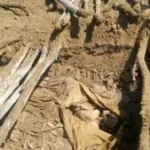By Sumaila Ogbaje
Mr Emmanuel Umar, a former Commissioner for Internal Security and Humanitarian Affairs in Niger, says the wide uncovered spaces in the state helped to breed terrorism, banditry and other criminalities.
Umar said this while delivering a lecture titled, “Ungoverned Spaces and National Security: A Personal Perspective”, at the Nigerian Army Heritage and Future Centre, on Thursday Abuja.
He defined ungoverned spaces as areas that lack effective governance and control by legitimate authority which can exist within boundaries of a country and in various forms.
Umar said that ungoverned spaces had presented significant challenges and remained a huge threat to national security, especially in Niger which has the largest landmass in Nigeria.
According to him, the state has 76,363 square kilometers of land and is bordered by six states of Kwara, Kogi, FCT, Kaduna, Zamfara and Kebbi, as well as Benin Republic.
“It has over 2,500 communities and 96 Forest Reserves and most of the rural communities are hard-to-reach due to either terrain or lack of access and infrastructures with no or minimal presence of government institutions or facilities.
“Such spaces provides safe haven and breeding grounds for terrorist, banditry and all sort of criminality.
“It allows easy recruitment, radicalisation and training grounds making it more difficult to monitor and police criminal activities.
“Ungoverned spaces facilitates easy criminal activities which include drug business and trafficking, arms and human smuggling, illegal mining of mineral resources and logging of economic trees.
“Criminal elements exploit the absence of law enforcement and regulation presence to operate freely at will, and engage in illegal extraction and exploitation of natural resources, thereby undermining the security and stability of the state,” the ex-commissioner said.
Umar explained that lack of effective governance often produce mass displacements of people who had became vulnerable to exploitation and often express their resentment against government institutions.
He added that such ungoverned spaces could also erode the authority and legitimacy of the state, allow non-state actors to assert control over specific areas, challenge constituted authorities, and undermine the state.
Umar said this would make it difficult to enforce legal systems, protect citizens’ right and maintaining social order, thus undermining public trust in government, spark civil disobedience and provide another opportunity for criminal networks to operate with impunity.
He said there was need to address the national security implication of ungoverned spaces through comprehensive and multidimensional approach, including effective governance, developmental efforts, security sector reforms, and strengthening institutions.
The ex-commissioner canvassed for the strengthening of the capacities of military and security forces, traditional institutions and functional local government authorities.
The Director General of the centre, Maj.-Gen. Obinna Ajunwa, thanked the guest speaker for delivering a well packaged paper, and the participants for their insightful contributions.
Ajunwa urged Umar to articulate the contributions of the participants to document another paper for the benefit of the Nigerian army. (NAN) (www.nannews.ng)
Edited by Maharazu Ahmed












